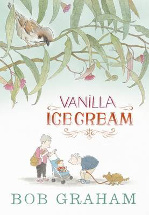Vanilla icecream by Bob Graham

Walker Books, 2014. ISBN 9781406350098.
(Age: 3-adult) Highly recommended. Picture book. Freedom. Sanctuary.
Journeys. India. Australia. Amnesty International. The simple act of
a sparrow pecking at crumbs on the table at a cafe, causes the dog
to leap, and an icecream to fall from a grandparent's hand onto the
child in her pusher. Edie has her first taste of icecream.
The sparrow has come from India, a place where food is not to be
wasted, and being a young bold bird, follows the food on a truck to
a ship, and within the cargo hold, the bird hitches a ride to
Australia.
The freedom of the sparrow in doing this contrasts vividly with
others around the world who do not get that choice, whose journeys
are curtailed.
The sparrow finds a new life in Australia, and can now be found at
the Botanic Cafe ready to peck at any crumbs that fall,
inadvertently setting in motion a series of events which culminates
in a simple new experience for Edie.
The bird's flight from India to Australia is beautifully presented,
the illustrations carefully planned to showcase each country and
contrast the lives led. In India, the sparrow is a truck-stop bird,
one that stays around the roadside samosa stall, waiting for any
opportunity. In Australia it eats the crumbs from the cafe tables.
Graham's perfect watercolour illustrations show the reader the
differences and similarities of both countries, children playing,
people serving food, the cafe and the samosa stall. India is
presented in detail, the man cooking the samosa in his stall, his
wife in the room next door making them, a chair and table outside
for customers, with palm trees standing silently behind, the iron
roof of the stall held down with bamboo, the scooter drawn vehicle
parked nearby, the paintings on the front of the trucks; each detail
reminds us of India. And in Australia, the black swans in the park,
the Botanic Cafe, grandparents looking after their grandchildren,
the Moreton bay fig tree, the eucalypts, show the readers aspects of
Australia.
Endorsed by Amnesty International, because 'we should all enjoy
life, freedom and safety', parents, readers and teachers all will be
encouraged to view the wider picture presented in this story.
Discussions around freedom, the right to choose, the right to be
safe can be evoked using this story, and many classrooms will use it
as the basis for cultural understandings as promoted in the
Australian Curriculum.
Fran Knight